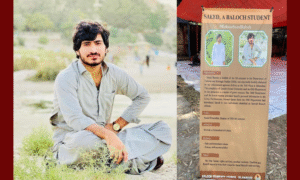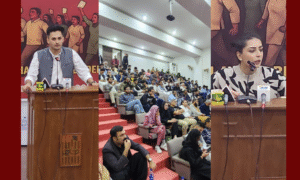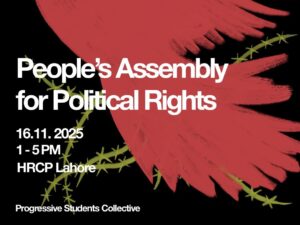Langston Hughes was born in 1902 to a family of abolitionists in ‘Joplin Missouri, USA’. Hughes is remembered as one of the leading literary figures of the Harlem Renaissance. The Harlem Renaissance was an intellectual and cultural revival of African American music, dance, art, fashion, literature, theater, and politics centered in Harlem, Manhattan, New York City, spanning the 1920s and 1930s. Hughes’ influence was not limited or restricted to art and politics within America. Hughes visited Russia in 1932, as a part of a group of actors hired to act in a Soviet film about race relations. He stayed in the Soviet Union for several months and visited different soviet territories including Uzbekistan. Hughes is a poet that inspires hope and does so gracefully. There is no mention of his political views in mainstream accounts of his life, nor is his ‘Red’ poetry included in any popular compilations of his work. There seems to be have been a very conscious effort in mainstream academia, particularly in the US, to try and continuously ignore the contributions of the left to art and politics. The way Langston Hughes is often taught is a bit similar to how we were taught Faiz in middle school; his political convictions were invisible in the work that was assigned to us and the interpretation of his work was always deradicalized and contextualized in a way that suits the needs of the status quo.
Although he never formally joined the communist party, he did, however, write poetry that was published by leftwing newspapers, such as his poem “ Ballads of Lenin”.
Comrade Lenin of Russia,
High in a marble tomb,
Move over, Comrade Lenin,
And give me room.
I am Ivan, the peasant,
Boots all muddy with soil.
I fought with you, Comrade Lenin.
Now I have finished my toil.
Comrade Lenin of Russia,
Alive in a marble tomb,
Move over, Comrade Lenin,
And make me room.
I am Chico, the N*gro,
Cutting cane in the sun.
I lived for you, Comrade Lenin.
Now my work is done.
Comrade Lenin of Russia,
Honoured in a marble tomb,
Move over, Comrade Lenin,
And leave me room.
I am Chang from the foundries
On strike in the streets of Shanghai.
For the sake of the Revolution
I fight, I starve, I die.
Comrade Lenin of Russia
Speaks from the marble tomb:
On guard with the workers forever —
The world is our room!
-Ballads of Lenin, Langston Hughes
Hughes’ work often speaks of the need for reforms geared towards empowering the working class, communist internationalism, and the need for an anti-capitalist revolution. Langston Hughes poetry appeals to those that believe in the united struggle of oppressed communities around the world and inserts autonomous and free-thinking black people into the narrative of working-class internationalism.
“Not me alone—
I know now—
But all the whole oppressed
Poor world,
White and black,
Must put their hands with mine
To shake the pillars of those temples
Wherein the false gods dwell
And worn-out altars stand
Too well-defended,
And the rule of greed’s upheld—
That must be ended.”
-Union, Langston Hughes
Hughes throughout his life was very unapologetically anti-status quo, both politically and culturally. We see in his poem “Note on Commercial Theatre” how he believes black culture and identity are being appropriated by industries that are and have been historically biased towards black people. He calls out Broadway and Hollywood for incorporating the best of the rising tide of Black artistic expression into art forms and narratives that did not acknowledge the struggle of or at times even the existence of black people.
“You’ve taken my blues and gone —
You sing ’em on Broadway
And you sing ’em in Hollywood Bowl,
And you mixed ’em up with symphonies
And you fixed ’em
So they don’t sound like me.
Yep, you done taken my blues and gone.
You also took my spirituals and gone.
You put me in Macbeth and Carmen Jones
And all kinds of Swing Mikados
And in everything but what’s about me —
But someday somebody’ll
Stand up and talk about me,
And write about me —
Black and beautiful —
And sing about me,
And put on plays about me!
I reckon it’ll be
Me myself!
Yes, it’ll be me.”
-Note on Commercial Theatre, Langston Hughes 1940
Hughes ends on a hopeful note that someday black people will redefine what it means to be beautiful, write their own stories and plays, and films. He dreams and inspires others to dream of a better, richer future for black folk. He expresses similar sentiments in his poem ‘I, Too’:
I, too, sing America.
I am the darker brother.
They send me to eat in the kitchen
When company comes,
But I laugh,
And eat well,
And grow strong.
Tomorrow,
I’ll be at the table
When company comes.
Nobody’ll dare
Say to me,
“Eat in the kitchen,”
Then.
Besides,
They’ll see how beautiful I am
And be ashamed—
I, too, am America.
-‘I, Too’, Langston Hughes 1926
Langston Hughes died of cancer in 1967. His work continues to inspire those who dream of a better more equal world.
Compiled by Hamza Waqas
The Students’ Herald News Desk focuses on reporting the latest news regarding student politics and campus updates to you.
The News Desk can be reached at admin@thestudentsherald.com




